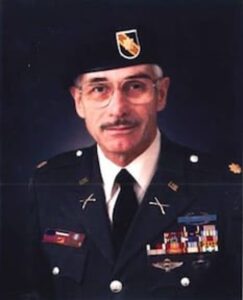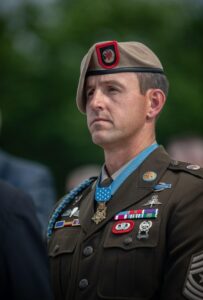November is recognized across the United States as National Veterans and Military Families month. On October 31, President Donald Trump proclaimed November 2018 National Veterans and Military Families month to “honor the significant contributions made by American service members, their families, and their loved ones.” As the men and women who serve our country do so selflessly, their loved ones also make daily sacrifices and we need to honor and thank our veterans and their friends and family for their commitments.
We are featuring the story of Medal of Honor recipient Barney Hajiro and his son Glenn Hajiro. We had the honor of speaking with Glenn Hajiro earlier this year to chat about his experience of being the son of a Medal of Honor recipient and to hear personal stories of how his father lived the ideals of the Medal in his everyday life.

Glenn grew up having no idea that his father was a decorated war hero. As a child, war was seldommentioned at home and his father certainly lived a modest life. He actually discovered his father’s heroic war history by snooping around his parent’s room – just as any other elementary aged child does. He found an interesting looking briefcase tucked away that was full of medals, ribbons and newspaper clippings. It was at this point he realized his father had had quite the life before starting a family and learned of his father’s heroic actions through the lone photo of his father in uniform saluting.
Learning of his father’s war heroism was the very beginning to the unfolding of his father’s story. Barney Hajiro was born on September 16, 1916, he grew up with an immense amount of American pride and hard work ethic. He was forced to quit school right after the eighth grade to help his father on the family plantation in his native Hawaii. As a young track star, Hajiro had the opportunity to attend high school through a track scholarship, but his help was needed on the plantation, where he earned a dollar a day. According to Glenn, “He never bought anything for himself. It was always for his family. Never for himself. He would help his friends and family and was always sharing. He really rubbed off on me that life was about family, hard work, and the love for your country.”
Barney Hajiro was living in Oahu working as a dishwasher and eventually as a stevedore on the docks of Honolulu Harbor. Then Pearl Harbor happened. Both of Glenn’s parents witnessed the attack and a year later his father was drafted into the Army – as the very last draftee on the island. His initial assignment was with the 1399th Engineers Battalion based in Kahuku, Oahu and in March 1942, he answered the call for volunteers to form the 442nd Regimental Combat Team. He served in the U.S. Army from 1942 to 1945 during which he fought in World War II.
 Hajiro was awarded the King George Medal in 1948 from the British, the Medal of Honor in 2000 from President Clinton and the Legion of Honor in 2004 from the French. When discussing the Medal of Honor ceremony in 2000, which Glenn and his family were able to attend at The White House, he described it as a special moment to be able to meet the President and other honorable individuals, but for his father it was even more special and powerful. Glenn recalls his father saying to himself and others, “visiting the Tomb of the Unknown Soldier reminded him of all his buddies who never made it back home and whose bravery was never acknowledged. He was accepting the Medal for them.”
Hajiro was awarded the King George Medal in 1948 from the British, the Medal of Honor in 2000 from President Clinton and the Legion of Honor in 2004 from the French. When discussing the Medal of Honor ceremony in 2000, which Glenn and his family were able to attend at The White House, he described it as a special moment to be able to meet the President and other honorable individuals, but for his father it was even more special and powerful. Glenn recalls his father saying to himself and others, “visiting the Tomb of the Unknown Soldier reminded him of all his buddies who never made it back home and whose bravery was never acknowledged. He was accepting the Medal for them.”
As a teenager, Glenn and his father did discuss the war and serving our Nation. He remembers his father telling him, “…that if I do go to war just make sure that you don’t make shame. You do your duty and you don’t do anything that would shame the family name. You fight for your country, you’re an American. You don’t shame your family and you don’t shame your country.”
Glenn has read plenty of stories about his father, a few that glorify his father’s actions and a few that are true reports. He once read that his father would visit the cemetery every day. While his father wasn’t able to visit the cemetery every day, he did visit often and would stop at certain markers. When Glenn would accompany his father to the cemetery he took note of which markers he stopped at and would do his research later as to who these special fallen comrades were. According to Glenn’s research, “One was the Sergeant who was next to my father when they initiated the charge up a slope to rescue the last battalion. The other marker was for the bazooka man that had helped my father load his rifle – the same battle that he participated in and it’s one of the ten significant battles in Army history.”
Glenn remarks that his father was a quiet individual who was very family-centric. He loved to listen to college athletics, mainly football, occasionally placing small bets with friends. His devotion and passion for his country carried over into his post-military career as he worked security for the Pearl Harbor Naval Shipyard in Hawaii. Glenn remembers fondly when he would visit his father at work and his father would hand him a fish to bring home to cook – he was fishing on his work breaks with a single hand line. He was driven and had a hard work ethic that he taught his children, which included never calling out of work.
When it comes to building a National Medal of Honor Museum and having a place to honor his father and the other 3,521 war heroes, Glenn is excited to have a place for these stories to live on. “I believe that if we let things die, nobody is going to know what happened. When I took history classes, you want to know the truth. We don’t want everything to be suppressed. Not just Medal of Honor recipient stories, but the stories of everyone who was involved – these stories and memories can’t die.”

Navigating the Darkest Night | The Courageous Leadership of Rear Admiral Bruce McCandless
Recipient: Bruce McCandless Branch: U.S. Navy Combat: World War II Sometimes fate has a way of showing us exactly where we need to be and


